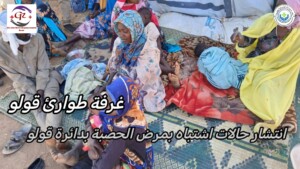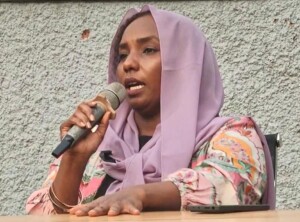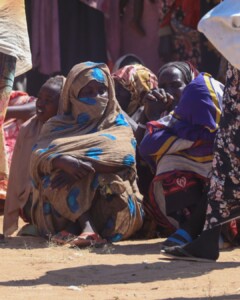More than 11,000 Covid-19 cases recorded in Sudan
As of July 24, 11,385 people have been infected with coronavirus in Sudan. 717 patients died, and 5,890 recovered.
The Directorate General of Emergency and Epidemic Control of the Sudanese Ministry of Health reported yesterday that 83 new cases were recorded on Thursday. Two deaths were reported, and 35 recoveries.
 Laboratory technicians in Sennar are trained in the use of GeneXpert for testing people on Covid-19, July 7 (Sudanese Health Ministry)
Laboratory technicians in Sennar are trained in the use of GeneXpert for testing people on Covid-19, July 7 (Sudanese Health Ministry)
As of July 24, 11,385 people have been infected with coronavirus in Sudan. 717 patients died, and 5,890 recovered.
The Directorate General of Emergency and Epidemic Control of the Sudanese Ministry of Health reported yesterday that 83 new cases were recorded in the country on Thursday. Two deaths were reported, and 35 recoveries.
Most of the states did not register new infections on Thursday.
In Khartoum, 30 new cases were registered, bringing the total of Covid-19 cases to 8,129 so far. Neighbouring El Gezira recorded 1,076 cases in total, including three new patients on Thursday.
Northern State reported 16 new cases, bringing the total number of infections to 208. One new patient was registered in Red Sea state, where 255 cases were registered so far.
With 21 new patients between July 19-23, Rive Nile state recorded a total of 340 cases. In White Nile state (177 in total) 12 new cases were registered between July 12-24.
Central Darfur remains the state with the lowest coronavirus numbers. Since July 6, when one new patient brought the total number to six, no new cases were recorded.
On July 7, the lockdown in Khartoum was eased. Curfew hours were reduced from 13:00-06:00 to 18:00-05:00, and the bridges between Khartoum, Omdurman, and Khartoum North were reopened for traffic. Flights to and from Khartoum International Airport resumed partially.
Two weeks later, 10,992 coronavirus patients were recorded in Sudan, showing “a noticeable increase” in the number of Covid-19 cases. The High Committee for Health Emergencies therefore extended the travel ban from and to Khartoum until after the five-day Eid El Adha (the Muslim Feast of the Sacrifice) holiday that starts on July 31.
Radio Dabanga’s editorial independence means that we can continue to provide factual updates about political developments to Sudanese and international actors, educate people about how to avoid outbreaks of infectious diseases, and provide a window to the world for those in all corners of Sudan. Support Radio Dabanga for as little as €2.50, the equivalent of a cup of coffee.












 and then
and then